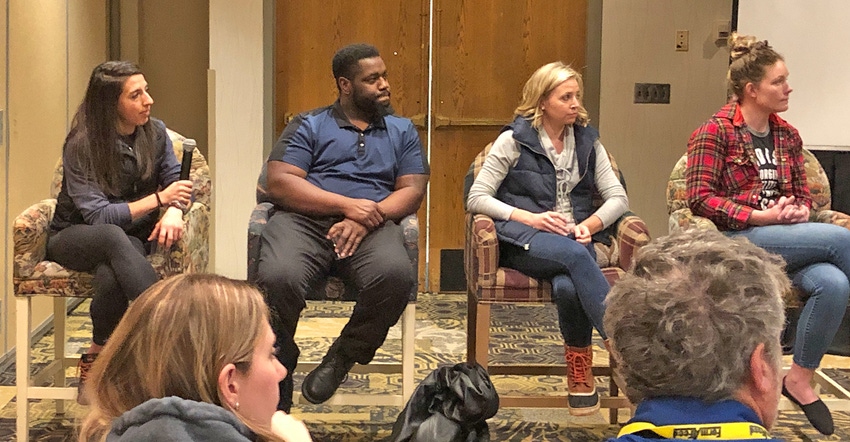
Fresh, local and “clean.”
That’s how four young adults described their food shopping habits while on a panel at the Minnesota State Cattlemen’s Association annual meeting Dec. 7 in Alexandria, Minn.
The panelists, selected for their willingness to share their opinions and food habits, also had zero exposure to farms. The panel was moderated by state Rep. Tim Miller, R-Prinsburg.
The panelists — Kacie Mercil, Robert Norman, Laura Nelson and Ali Ziesmer — appeared before a standing-room-only crowd of farmers interested in hearing what they had to say. All live in the Alexandria area. Nelson and Ziesmer also have children; Mercil and Norman do not.
The discussion covered everything from animal care to looking at farming 25 years from now. Here are some of the questions and responses from the panelists.
On hormone and antibiotic use in livestock. Nelson expressed the most concern about hormone use in cattle since she has three daughters. She said she heard about research that noted earlier physical development of girls and pinned it on hormone use in animals. Norman said he was somewhat concerned about antibiotic and hormone use in cattle and doesn’t want it in his beef.
On organic products — are they important? Three of the four said no, buying organic is not important to them.
A product with an organic label might cause Nelson to stop and look at the product. “If an organic emblem is on it, I might be inclined to buy it because it’s free of hormones,” she said.
Mercil said she doesn’t usually buy organic foods due to their prices. “Organic is more expensive,” she said.
Norman said he looks for the lowest fat content in foods, since less-fatty foods would have fewer chemicals in them.
Ziesmer said organics have “a bigger show than what it is. You are better off eating more ‘clean,’ whole foods,” she said.
On food purchasing habits. All four eat at least 90% or more of their meals at home. Norman eats out once a week; Mercil rarely eats out. Weekly grocery bills for the four are: Mercil, $80-100, shopping once per week; Nelson, $120, shopping once per week; Ziesmer, $175 to $200, shopping weekends and if needed, quick trips to the store in between; and Norman, $150 for meals for two guys.
“I stock up on meat,” Norman added. “I eat a lot of lamb.”
Mercil focuses on buying what is on sale for that week, including fresh foods. “I buy whole foods — no processed foods and no boxed foods,” she said. “And I buy unfrozen meats.”
Norman also buys fresh foods and stays away from frozen foods. “Freezing foods affects texture,” he said.
On their biggest concerns about food. Mercil said she is concerned about food processing and added chemicals, dyes and colorings. Norman said he is concerned about food packaging and the microplastics used. Ziesmer said she would like to know that farm families are treating their animals well and care for them humanely prior to slaughter. Nelson added that she trusts her local grocery store and trusts farmers who produce food.
On the future changes in farming over the next 25 years. “I’d like to see more support for [small] farms,” Mercil said. “I like to eat ‘clean’ and would like to see the market go more toward that, and steer away from boxed foods.”
Norman would like grass-fed beef to be more accessible. “I grew up on a lot of lamb and local beef,” he said. “I don’t want to buy New Zealand lamb. It’s hard to find [U.S.] lamb in small quantities.”
Nelson wants to continue to support local food producers. “I can’t buy my meat from Walmart. That’s hard for me,” she said.
Ziesmer agreed with Norman and said she would like more local meats available. “I’d like some locally raised beef available in Alexandria,” she said. “I want to support local growers.”
At the conclusion of the panel discussion, Miller asked the participants if a visit to a farm would help them feel more confident about food production. All four said yes.
And all four will have the chance to visit farms come summer. At the end of the meeting, a beef producer in the audience stood up and announced passes had been donated for them to attend the MSCA Summer Tour, to be held July 9 in the Morris area.
About the Author(s)
You May Also Like






